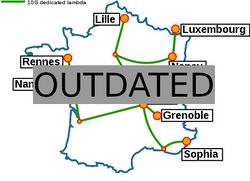Grid5000:Home
|
Grid'5000 is a large-scale and versatile testbed for experiment-driven research in all areas of computer science, with a focus on parallel and distributed computing including Cloud, HPC and Big Data. Key features:
Older documents:
|
Random pick of publications
Five random publications that benefited from Grid'5000 (at least 2937 overall):
- François Lemaire, Louis Roussel. Parameter Estimation with Integral Elimination. Differential Algebra and Related Topics XII, Apr 2024, Kassel, Germany. . hal-04576171 view on HAL pdf
- Cédric Prigent, Alexandru Costan, Gabriel Antoniu, Loïc Cudennec. Enabling Federated Learning across the Computing Continuum: Systems, Challenges and Future Directions. Future Generation Computer Systems, 2024, 160, pp.767-783. 10.1016/j.future.2024.06.043. hal-04659211 view on HAL pdf
- François Portier, Lionel Truquet, Ikko Yamane. Nearest Neighbor Sampling for Covariate Shift Adaptation. 2024. hal-04645530 view on HAL pdf
- Daniel Balouek. Performance-cost trade-offs in service orchestration for edge computing. SSDBM 2024 - 36th International Conference on Scientific and Statistical Database Management, Edge Computing; Resource Management; Computing Continuum; Trade-offs; Urgent Computing, Jul 2024, Rennes, France. pp.1-4, 10.1145/3676288.3676307. hal-04775133 view on HAL pdf
- Chih-Kai Huang, Guillaume Pierre. UnBound: Multi-Tenancy Management in Scalable Fog Meta-Federations. UCC 2024 - 17th IEEE/ACM International Conference on Utility and Cloud Computing, Dec 2024, Sharjah, United Arab Emirates. pp.1-11. hal-04760398 view on HAL pdf
Latest news
Failed to load RSS feed from https://www.grid5000.fr/mediawiki/index.php?title=News&action=feed&feed=atom: Error parsing XML for RSS
Grid'5000 sites
Current funding
As from June 2008, Inria is the main contributor to Grid'5000 funding.
INRIA |
CNRS |
UniversitiesUniversité Grenoble Alpes, Grenoble INP |
Regional councilsAquitaine |


